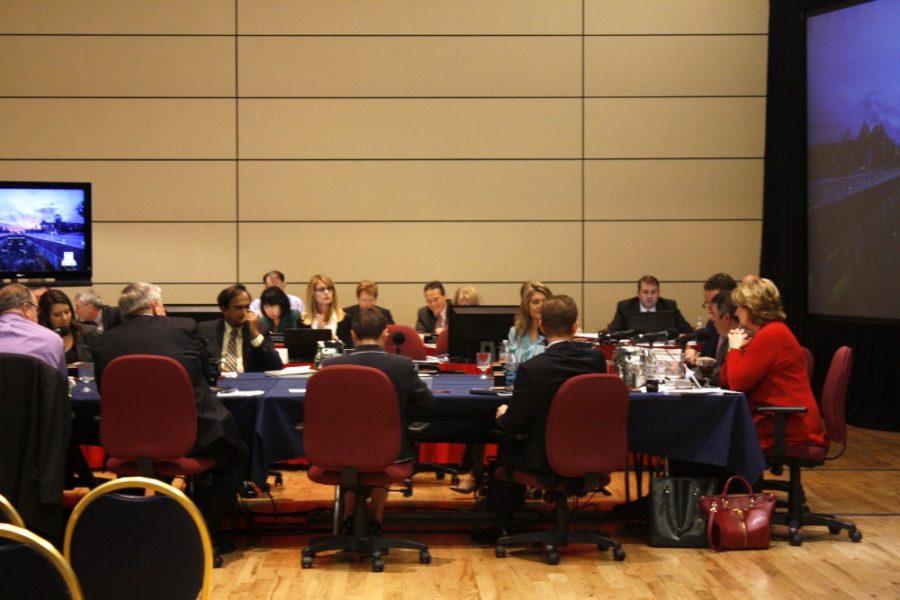The Appointed Professionals Advisory Council at the UA had its 2015 annual meeting on Monday. New bylaws were voted on and President Ann Weaver Hart came to speak about the goals of the UA as the 2016 fiscal year fast approaches.
What is APAC?
APAC is a group of appointed professionals that participate in community life on campus. APAC represents all professional employees on campus including lecturers, researchers, directors and non-faculty administration who rely on year-to-year appointments.
The group was chartered in 1992 to give a voice to professionals who work on campus but are not considered faculty.
The UA, along with many public universities around the U.S., practices shared governance.
Important decisions on budget and policy are made by three main groups: the president of the university, the governing board and the faculty. According to Mark Napier, appointed chair of APAC and associate director of operations for Parking and Transportation Services, appointed professionals “fill a vital niche between employees and staff,” and thus need an organization where they can make their voices heard.
The organization has almost 4,000 professionals and is looking to gain a wider range of participation from professionals around campus. APAC’s goal is to enhance the quality of career life for all appointed professionals by advising the UA administration.
Never Settle
During the annual meeting, Hart reported on progress being made on UA’s Never Settle Strategic Plan that was launched in 2013. She focused on the four main pillars: engaging, innovating, partnering and synergy.
Engaging
The UA is committed to unwavering student support. Over half of Patricia Bartlett’s $2 million donation will be used to improve the SALT Center. It will now be linked to the Think Tank in order to provide students of all learning styles an opportunity to receive free tutoring.
The fiscal budget for 2016 will allow students to retroactively join the tuition guarantee program. It will cost the university $2.5 million to provide this, according to Hart.
Innovating
Goals include promoting the UA’s core strengths and areas with great potential for growth. Hart identified areas on which funding will be focused as defense and security—“I’m not talking missiles here”—space systems, environmental sciences and health sciences.
Health Sciences has shown great potential for growth, especially with a recent endowment of $300 million from Banner Health, according to Banner—Health University Medical Center’s wesite.
Partnering
Hart said she was excited about the UA’s partnership with Banner Health, Uber, Japan and Dubai who is partnering with UA for Expo 2020.
Hart said she is currently talking to a few other entities about potential partnerships and will be announcing those soon if all goes according to plan.
Synergy
“Trying times” was a term used frequently in the meeting. Hart said that this is not an easy year for Arizona universities, especially after Gov. Doug Ducey and the state legislature cut $99 million from university funding.
Hart said she is looking to corporate partnerships and the state legislature for help.
Hart supports the Arizona Board of Regents’ plan to ask the legislature to vote in support of paying for half of undergraduate tuition for Arizona residents. ABOR will make the proposal at the monthly meeting in Flagstaff this week.
“Stop collecting our tuition and playing with us on tuition remittance …” Hart said. She believes the university should have more autonomy to manage its own fiscal house.
Concern over the UA becoming more autonomous was expressed during the Q&A.
“I work on an area that not all people believe is a priority,” said Ben Champion, director of the Office of Sustainability. “Does this proposal invite greater scrutiny in terms of auditing what the costs are?”
Hart laughed and said, “That horse left the barn decades ago and they already called me to complain about you. … [The state legislature doesn’t] think we should have a humanities college for goodness sake, and that poetry is irrelevant to the mission of a land grant university.”
Hart believes that enough people are willing to champion the humanities and areas of study, such as sustainability, that they will stay put regardless of what the legislature says.
Follow Michelle Jaquette on Twitter.









